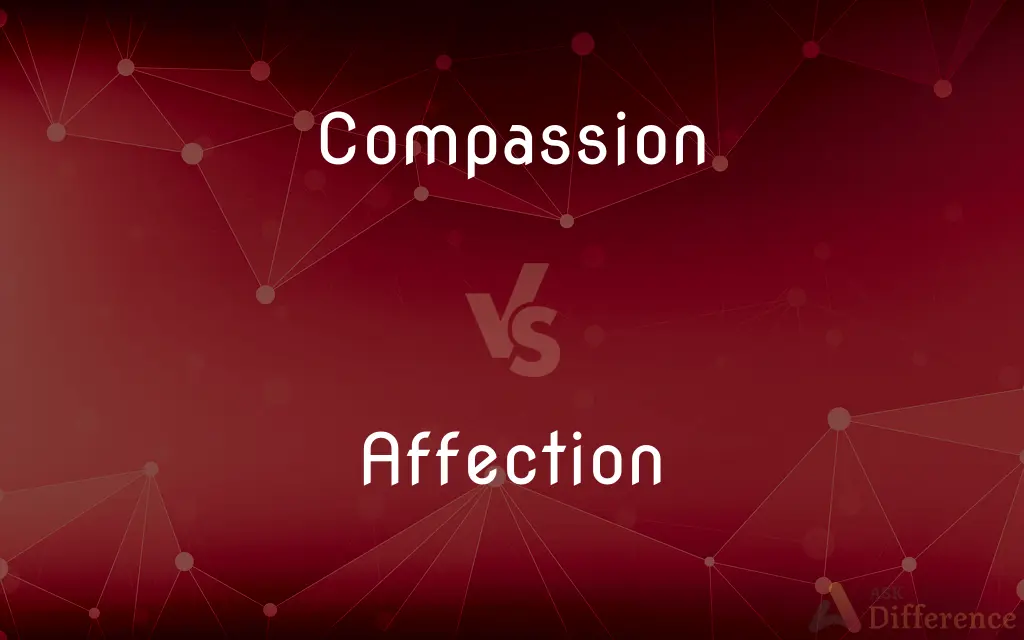Compassion vs. Affection — What's the Difference?
By Maham Liaqat & Urooj Arif — Updated on April 3, 2024
Compassion is the empathetic understanding and concern for others' suffering, while affection is a fondness or tender feeling toward someone.

Difference Between Compassion and Affection
Table of Contents
ADVERTISEMENT
Key Differences
Compassion is a deep awareness of and sympathy for another's suffering, coupled with the desire to alleviate that suffering. It extends beyond personal relationships and can be felt for strangers or humanity at large. Compassion drives charitable acts, volunteering, and support for those in need. On the other hand, affection is a warm feeling of fondness and liking towards someone, often expressed through physical touch, kind words, and other intimate gestures. Affection usually arises within personal relationships, such as between family members, friends, or romantic partners.
While compassion involves a profound emotional response to the pain and struggles of others, motivating an altruistic concern and action to help, affection is more about personal attachment and emotional closeness. For instance, one might feel compassion for people suffering from a disaster on the other side of the world, whereas affection is shown to those with whom one has a close bond. Compassion can be seen as a broader, more inclusive emotion, while affection is more selective and intimate.
Compassion is often associated with a moral and ethical dimension, reflecting a sense of shared humanity and a universal desire to help those in distress. It can inspire individuals to reach out beyond their immediate circle and make a positive impact on the broader community or society. In contrast, affection strengthens individual relationships, building trust, security, and emotional depth between people. It is foundational to the development of strong, healthy personal connections.
Despite their differences, both compassion and affection are crucial for human connection and societal well-being. Compassion fosters a sense of global community and shared responsibility, while affection nurtures individual relationships and personal well-being. Each plays a unique role in human emotional experiences, contributing to our collective and individual capacities for empathy, care, and love.
Comparison Chart
Definition
Sympathy and concern for the sufferings or misfortunes of others.
A tender feeling of fondness or liking towards someone.
ADVERTISEMENT
Focus
Others' suffering and a desire to alleviate it.
Emotional closeness and personal attachment.
Expression
Through altruistic actions and empathy.
Through intimate gestures, physical touch, and kind words.
Scope
Can be felt for anyone, regardless of personal connection.
Generally reserved for those with whom one has a personal relationship.
Associated Actions
Charitable acts, volunteering, emotional support.
Hugs, affectionate words, spending quality time together.
Compare with Definitions
Compassion
Moral and ethical dimension of care.
Acts of compassion often reflect deep moral convictions.
Affection
Intimate and personal expression of love.
They shared their affection through daily acts of kindness.
Compassion
Rooted in empathy and shared humanity.
His compassion for the afflicted inspired a lifelong commitment to humanitarian work.
Affection
Warm feelings of fondness towards someone.
She showed her affection for her grandmother with a tight hug.
Compassion
Universal and inclusive emotion.
Compassion knows no borders, reaching out to those in need everywhere.
Affection
Expressed through physical touch and closeness.
Their affection for each other was evident in their gentle touches.
Compassion
A drive to alleviate others' pain.
Compassion motivates many to donate to crisis relief funds.
Affection
Basis for strong personal relationships.
Affection between friends strengthens their bond.
Compassion
Feeling empathy and concern for others' suffering.
Her compassion led her to volunteer at the homeless shelter.
Affection
Emotional attachment and care.
Parental affection is crucial for a child's emotional development.
Compassion
Compassion motivates people to go out of their way to help the physical, mental, or emotional pains of another and themselves. Compassion is often regarded as having sensitivity, which is an emotional aspect to suffering.
Affection
Affection or fondness is a "disposition or state of mind or body" that is often associated with a feeling or type of love. It has given rise to a number of branches of philosophy and psychology concerning emotion, disease, influence, and state of being.
Compassion
Sympathetic pity and concern for the sufferings or misfortunes of others
The victims should be treated with compassion
Affection
A gentle feeling of fondness or liking
He won a place in her affections
She felt affection for the wise old lady
Compassion
Deep awareness of the suffering of another accompanied by the wish to relieve it.
Affection
The action or process of affecting or being affected.
Compassion
Deep awareness of the suffering of another, coupled with the wish to relieve it.
Affection
A tender feeling toward another; fondness.
Compassion
(obsolete) To pity.
Affection
Often affections Feeling or emotion
An unbalanced state of affections.
Compassion
Literally, suffering with another; a sensation of sorrow excited by the distress or misfortunes of another; pity; commiseration.
Womanly ingenuity set to work by womanly compassion.
Affection
A disposition to feel, do, or say; a propensity.
Compassion
To pity.
Affection
(Obsolete) Prejudice; partiality.
Compassion
A deep awareness of and sympathy for another's suffering
Affection
The act of affecting or acting upon.
Compassion
The humane quality of understanding the suffering of others and wanting to do something about it
Affection
The state of being affected, especially: a change in, or alteration of, the emotional state of a person or other animal, caused by a subjective affect (a subjective feeling or emotion), which arises in response to a stimulus which may result from either thought or perception.
Affection
An attribute; a quality or property; a condition.
Affection
An emotion; a feeling or natural impulse acting upon and swaying the mind.
Affection
A feeling of love or strong attachment.
I have a lot of affection for my little sister.
The marriage therapist suggested they show each other more affection.
Affection
A disease; a morbid symptom; a malady.
Affection
To feel affection for.
Affection
The act of affecting or acting upon; the state of being affected.
Affection
An attribute; a quality or property; a condition; a bodily state; as, figure, weight, etc. , are affections of bodies.
And, truly, waking dreams were, more or less,An old and strange affection of the house.
Affection
Bent of mind; a feeling or natural impulse or natural impulse acting upon and swaying the mind; any emotion; as, the benevolent affections, esteem, gratitude, etc.; the malevolent affections, hatred, envy, etc.; inclination; disposition; propensity; tendency.
Affection is applicable to an unpleasant as well as a pleasant state of the mind, when impressed by any object or quality.
Affection
A settled good will; kind feeling; love; zealous or tender attachment; - often in the pl. Formerly followed by to, but now more generally by for or towards; as, filial, social, or conjugal affections; to have an affection for or towards children.
All his affections are set on his own country.
Affection
Prejudice; bias.
Affection
Disease; morbid symptom; malady; as, a pulmonary affection.
Affection
The lively representation of any emotion.
Affection
Affectation.
Affection
Passion; violent emotion.
Most wretched man,That to affections does the bridle lend.
Affection
A positive feeling of liking;
He had trouble expressing the affection he felt
The child won everyone's heart
Common Curiosities
Can one feel compassion without affection?
Yes, one can feel compassion for strangers without having personal affection for them.
How can compassion impact society?
Compassion can lead to altruistic actions, fostering a more empathetic, supportive, and interconnected society.
Is compassion a learned behavior or an innate emotion?
It's both; humans have an innate capacity for compassion, but its expression can be influenced and enhanced by social and environmental factors.
How does showing affection affect one's mental health?
Showing and receiving affection can significantly improve mental health by reducing stress, increasing happiness, and fostering a sense of belonging.
What is the main difference between compassion and affection?
The main difference lies in their focus: compassion is about empathy and concern for others' suffering, while affection is about fondness and emotional closeness to someone.
What are the barriers to compassion?
Barriers to compassion can include prejudice, burnout, desensitization to suffering, and a lack of understanding or empathy.
Is affection necessary for a healthy relationship?
Yes, affection is a fundamental element that nurtures and maintains emotional connection in healthy relationships.
Why is compassion important in times of crisis?
In times of crisis, compassion drives collective action to support those affected, helping alleviate suffering and build resilient communities.
What role does affection play in child development?
Affection plays a critical role in child development, contributing to emotional security, self-esteem, and the ability to form healthy relationships.
Is it possible to develop affection over time?
Yes, affection can develop and deepen over time through shared experiences, trust, and emotional intimacy.
Can affection be expressed in non-physical ways?
Absolutely, affection can also be expressed through words of affirmation, acts of service, and quality time spent together.
How does social media affect expressions of compassion and affection?
Social media can amplify expressions of compassion and affection by providing platforms for sharing support and solidarity, though it can also lead to superficial or performative displays.
Can showing too much affection be detrimental?
While generally positive, excessively showing affection without respecting boundaries can be overwhelming or uncomfortable for others.
How do cultural differences influence expressions of affection and compassion?
Cultural norms and values significantly shape how individuals express affection and compassion, with variations in both the form and frequency of these expressions across different societies.
How can one cultivate compassion?
Cultivating compassion involves practicing empathy, engaging in acts of kindness, and developing an understanding of the interconnectedness of all beings.
Share Your Discovery

Previous Comparison
Big vs. Little
Next Comparison
Glove vs. CloveAuthor Spotlight
Written by
Maham LiaqatCo-written by
Urooj ArifUrooj is a skilled content writer at Ask Difference, known for her exceptional ability to simplify complex topics into engaging and informative content. With a passion for research and a flair for clear, concise writing, she consistently delivers articles that resonate with our diverse audience.













































